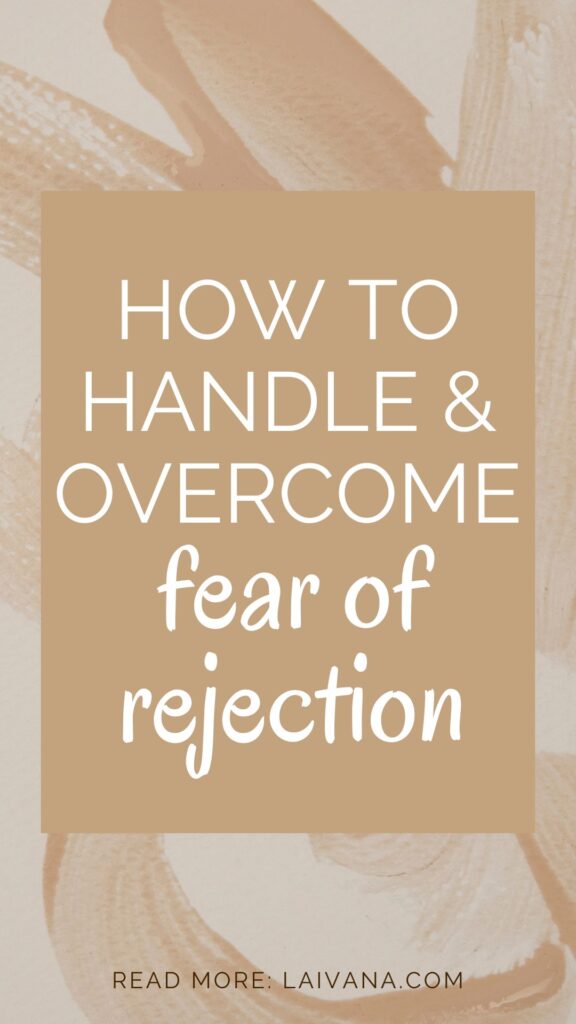
Have you experienced the fear of rejection recently?
Maybe you wanted to do something for the first time, get out of your comfort zone, ask someone for a favor, or reach out to someone but your fear of rejection was holding you back from following through.
If you can relate to that, then this blog post is for you. I’ll share some questions I ask my coaching clients when they struggle with fear of rejection and mindset shifts to help you handle rejection.
>> Prefer audio format? This blog post was first published on my podcast, The La Ivana Podcast. Listen to episode: How to Deal With Rejection (and Not Let It Hold You Back) here.
Before we start, let’s acknowledge that getting rejected sucks.
You’ve probably heard quotes like ‘’Rejection is only a redirection’’ or ‘’Rejection is a sign from the Universe that something better is coming’’ Quotes that try to make you feel better about the fact that you just got rejected.
But what we need to realize is that we can’t dictate other people’s behaviors. You can do your best and still get rejected.
So instead of hoping to avoid rejection, you need to build stability within yourself. That way whether or not you get rejected doesn’t affect the way you see yourself and it doesn’t affect your next step.
Having stability and safety within yourself puts you in the mindset of ‘’I’m still a powerful badass woman and I’m still going to do what’s required of me in order to achieve my goal. This rejection is just a moment in my past, but I’m focused on creating my desired future and I’m not going to entertain the frequency of that rejection. I’m moving forward.’’
So don’t reject yourself. Your boyfriend/partner/parents/kids can reject you – but don’t reject yourself and hold yourself back from going after what you want.
Now let’s say you want to do something and you’re afraid of getting rejected. This is what I would ask you:
1) So you get rejected… Then what?
I know. Worst-case scenario: you get rejected. But then what?
What’s going to happen if you get rejected?
Yes, you might feel embarrassed or ashamed, but when it comes to the actual result – What’s going to happen if you get rejected?
Most often, the answer is ‘’nothing’’.
That’s the worst-case scenario. Nothing will happen and you’ll be right where you are now.
Best-case scenario? You’ll get a step closer to your goal.
We’re often afraid of the emotions coming up, what will someone else think, and what if we embarrass ourselves.
But the actual result that comes with the rejection? Nothing.
You’ll just have to try again or try differently.
Read next:
6 Tips to Overcome Obstacles + Journal Prompts for Dealing with Obstacles
2) What are you making the rejection mean about yourself?
“When you give yourself permission to communicate what matters to you in every situation you will have peace despite rejection or disapproval. Putting a voice to your soul helps you to let go of the negative energy of fear and regret.”
― Shannon L. Alder
This is a big one.
We would rather stay in our comfort zone than face rejection and feel embarrassed, not good enough, stupid for even trying, or disappointed in ourselves.
Recently, I asked 5 women for an interview on my podcast (The La Ivana Podcast). Here are the results I got:
YES – 2 (both interviews are already recorded and published)
NOT RIGHT NOW – 2 (one told me that she’d love to be on my podcast and to connect again next month because she’s traveling currently and the other will let me know later this month when her schedule clears out)
NO REPLY – 1
Previously when I reached out to someone and they wouldn’t reply, I used to think thoughts like:
‘’They probably think my podcast audience is not large enough so they don’t want to waste their time.’’
‘’I probably wrote a lousy email that wasn’t compelling enough for them to say yes.’’
You know, thoughts that go in the ‘self-doubt’ category. I used to make someone’s rejection mean something negative about myself
Now, on the other hand, when I get a no or there’s no reply, I move on because I know that whether someone is going to say yes or no isn’t something that I’m responsible for.
I’m not responsible for other people’s actions. I can do my part (reach out or send an email), but what they’re going to do about that email is entirely in their control.
I don’t make it mean anything about me, my podcast, my email writing skills, or them.
So answer this for yourself, what are you making the rejection mean about your potential?
What are you making it mean about whether or not something is meant for you?
Sometimes, when my coaching clients experience rejection or some other type of obstacle, they say to me ‘’Maybe that’s just not meant for me’’ or ‘’Maybe I’m not meant to be doing that.’’
And no. It’s not God or the Universe holding you back and telling you you’re not meant for something.
You get to decide what’s meant for you.
And when you decide something is meant for you – you do not stop in spite of the obstacles or rejections that happen on the way.
Related:
How to Set Effective Boundaries That Will Be Honored
How to Rely on Yourself // Journal Prompts for Self-Reliance to Increase Self-Confidence
PIN FOR LATER 🙂

3) What are you making the rejection mean about the world/that person/people in general?
“When you’re following your inner voice, doors tend to eventually open for you, even if they mostly slam at first.”
― Kelly Cutrone
When you get rejected, your immediate thoughts might sound something like this:
‘’No one wants what I have to offer.’’
‘’It’s easier for others.’’
‘’All the good guys/women are already taken.’’
‘’My family is always too ____ about me/my job/my relationships.’’
‘’My boss never wants to see me as capable enough/smart enough so I’m not even going to try to ask for a promotion/to start a new project/to share my ideas with him/her.’’
But is that actually a fact or are you just collecting evidence to support your fear of rejection so that you get to stay in your comfort zone and avoid taking action?
Your immediate thoughts come to your mind by default based on what you’re used to thinking and believing. It isn’t that easy to affect your immediate in-the-moment thoughts.
But you can manage your mind to choose what you’re going to think next and where you’re going to go from that initial thought.
What you make things mean will always determine if you’re going to hold yourself back or take action in spite of the fear of rejection or some other limiting belief.
You don’t have to overcome your fear of rejection entirely. But in order to grow and take action, you need to be able to deal with and manage that fear when it shows up so that it doesn’t hold you back.
Until the next time,
Ivana



These are so useful tips.The fear of rejection hit me hard! People who fear rejection may struggle with low self-esteem and spend alot of time worried about what others think of them.
These are so useful tips! People who have a fear of rejection are afraid of not being liked, being abandoned, not fitting in or being alone. People who fear rejection may struggle with low self-esteem, lack of confidence, shame, or guilt, and spend a lot of time and energy worrying about what others think of them. Great Post.
I definitely fall into the “rejecting myself” category and need to work on it. These are fantastic tips that I can’t wait to try! Great post!
The fear of rejection hit me HARD last year! I’m swinging back into 2023 by challenging myself with letting go of that fear. But it’s certainly an easier-said-than-done process. Thanks for sharing!